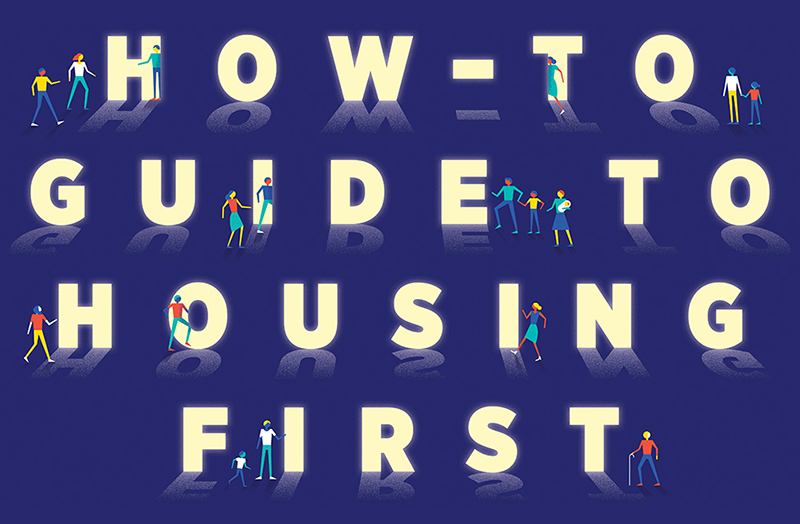You are viewing 1 of your 1 free articles
How-to guide to Housing First
Housing First is helping people with complex needs out of homelessness. Martin Hilditch finds out how social landlords can get involved
Over the past four years, Tina (not her real name) has lurched from one location to the next on an unstable tour of the homelessness system.
“I’ve slept on lots of settees,” she says. “I’ve slept in about four or five different Travelodges.” She’s also slept rough and, attempting to escape from a violent partner, in a couple of domestic violence refuges.
“The longest I have lived in one place over the past two to three years is two to three months,” she says - and that was in a refuge that extended her stay when she got assaulted just before she was due to leave.
Throughout this time, she has been attempting to deal with a drug problem. Because of her circumstances, her children have had to go and live with a relative. Shoplifting “so I could survive, really” completes a snapshot of her recent history.
Today, Tina, who is in her 30s, is feeling much more optimistic about life. In fact, her temporary accommodation days are behind her and she is in a permanent home. She’s been here for about a month, and this is the most stable housing she’s had in years.
It’s not Buckingham Palace, but it looks great - and she talks about adding to the basic furnishings with the enthusiasm of someone embracing what had seemed like a pipe dream. Mind you, it’s all a bonus when simply “moving in felt like I had everything”.
Tina ended up in her home after being referred by a refuge to a relatively new service run by Threshold, a Greater Manchester housing advice and support charity, which is part of New Charter Group.
The service was set up in 2015 specifically to support vulnerable women who have histories of offending and substance misuse. Most have been victims of domestic violence.
Readers who have been following Inside Housing’s Cathy at 50 campaign will already have guessed that we’re talking about a Housing First service.
At its most basic, Housing First flips the traditional UK homelessness model on its head and offers homeless people permanent housing alongside intensive support to help maintain the tenancy, rather than forcing them to jump through hoops before they are deemed “housing ready”.
“Housing First helps the most excluded and the most vulnerable people; isn’t that why housing associations were set up?”
Jo Prestidge, Housing First England
It’s not commonly used in the UK, but international evidence suggests it works for people with long histories of homelessness and significant health and well-being needs.
Cathy at 50 calls for councils to explore Housing First as a default option for long-term rough sleepers and commission schemes. We also call for housing associations to get involved by identifying additional stock for these projects.
For Tina, permanent accommodation has provided a settled base. She says she also has plenty of support from a case worker.
“Sometimes I speak to her four or five times a day. All I have to do is text and I get a phone call straight away. [Before] I wasn’t getting any support, even though I was in a refuge.”
Tina feels like she is making progress. She says that she had a spare £17 at the end of the week and spent it on furnishings. “Normally I would have bought drugs,” she adds.
Her relationship with her children has improved and, for the first time in years, she is planning for the future, even talking about the possibility of starting a college course.
None of this would have been possible without Threshold embracing Housing First. People like Tina, with a history of offending and multiple needs, don’t tend to jump to the top of allocations lists. “The council’s housing options [service] refused to help me,” she states.
Giving direction
We’ll come back to the evidence base Threshold has pulled together from its pilot shortly. What, though, are the options for housing associations that are curious about Housing First? How can they translate interest into action? Or, to put it bluntly, why should they bother to get involved?
New guidance published this week by Homeless Link, the national membership body for the homelessness and supported housing sectors, aims to provide some answers. Its report is aimed specifically at social landlords and acts as something of a ‘how-to’ guide - as well as tackling the ‘why get involved?’ question head on.
“Even if they mess up, we don’t give up on people.”
Amanda Bloxsome, Threshold
One of the most intriguing arguments put forward in Homeless Link’s guidance relates to welfare reform. Numerous changes to the welfare system in recent years - such as the bedroom tax, Universal Credit and the benefit cap - have meant housing the most poor and vulnerable people can feel a bit like steering a spaceship through a meteor shower. Homeless Link’s report argues that Housing First “may help to overcome some of these challenges”.
It points out that rule changes mean people under 35 who do not have children can only claim benefits for a single room, with housing costs only covered up to the Local Housing Allowance (LHA) shared accommodation rate.
But people over 25 with histories of accessing homelessness services, rehabilitation services or other support can claim for a one-bedroom LHA rate (as can care leavers and prisoners subject to multi-area public protection arrangements).
The guidance states: “Individuals who fall into one of these groups are likely to be eligible for and in need of support offered by Housing First”. It also points out that the benefit cap does not apply to people claiming Employment and Support Allowance or Personal Independence Payments. Because Housing First is targeted at the most vulnerable homeless people with the greatest needs, this is likely to apply to many Housing First tenants.
But the main focus of the guidance is on how social landlords can get involved in Housing First. The guide looks at two main types of provider: general needs that do not provide supported housing, and those that are both housing and support providers.
General needs providers without supported housing have two main routes in. They can either offer accommodation to a service that is already running, or work with local councils and other service providers to set up a new service. Providers can find out about existing schemes on the Housing First England website.
Associations that already provide supported housing, on the other hand, could set up their own service, sourcing funding from either local authorities, trusts and foundations, or from their own internal resources.
Jo Prestidge, innovation and good practice project manager at Housing First England with Homeless Link, says there is also a “moral argument” for housing associations to explore using the model.
“This is [about] addressing a need in your local area,” she states. “Housing First is addressing poverty and [helping] the most excluded and the most vulnerable people. Isn’t that why housing associations were set up?”
As previously mentioned, Threshold has already jumped in and now provides Housing First across three authorities in Greater Manchester. It accesses housing through parent company New Charter Group - although Tina is in a private rented home due to the importance of placing her in the right location as a victim of domestic violence.
“It would be good if Housing First could be offered to courts as an alternative to custody.”
David Hoyle, New Charter Group
Amanda Bloxsome, Housing First manager at Threshold, says most of the referrals to the project come from domestic violence services and prisons. She says the results have been good so far, with 80% of the tenancies being sustained (the project has space for 12 women at a time and has to date worked with 29). Ms Bloxsome adds that the support provided is just as vital as the accommodation.
“It is very important to make sure we get the support right as well,” she says. “A lot of people say they are customer-centred, but they are offering two hours [of support] a week maximum. Ours is very customer centred. One week it might be 10 hours [of support needed]. Another week there might be no hours. The support is dictated by the customer.”
The support is also unconditional. “Even if they mess up, we don’t give up on people,” Ms Bloxsome adds.
While there will undoubtedly be problems that arise with such vulnerable people, it is also true to say that the women Threshold works with are demonstrably in a better place than before their involvement.
“We haven’t got any rent arrears,” Ms Bloxsome says. “Every single one of our customers has reduced offending. We had one lady who had 140 offences the year before she came. The year she lived with us she had no offences.”
Rolling it out
Mushtaq Khan, director of commercial partnerships at New Charter, says that at the outset the group invested £200,000 of its own money - from an existing innovation fund - in the project. It has just won additional funding from an unnamed benefactor to keep the Housing First service running for three more years. Its initial analysis suggests that every £1 spent on the project results in wider taxpayer savings of £2.51.
One of the reasons he thinks other providers might want to look at Housing First is that it achieved results with “probably the most difficult client group”.
Inside Housing revealed last week that the 27-member Greater Manchester Housing Providers group is considering making units available for a Housing First programme, following Andy Burnham’s election as the Greater Manchester mayor.
Mr Khan thinks there will be progress. “I think there will be a Housing First programme at regional level,” he says. Nationally, Threshold is working with the University of York to evaluate its Housing First service, and has committed to publishing the learning.
The service has certainly won over some people who were initially sceptical. Shonna Hildersley, allocations manager at New Charter Group, which supplies accommodation for Threshold, says she had her doubts when she first heard about the plans.
“My reaction when I first heard about it was ‘ooh, no’,” she says with a smile. Today she says her opinion has changed based on what she has seen. “It works,” she states.
What is clear is that the women on the Housing First scheme would have been left in a much trickier position if it didn’t exist.
“The client group doesn’t fit our general allocations policy,” Ms Hildersley states. “They have very complex needs. They are people that we generally wouldn’t take a risk on through our general lets.”
The results so far have led some in the organisation to dream about how Housing First could expand.
David Hoyle, business impact and innovation lead at New Charter Group, says: “At some point in the future it would be very good if Housing First could be offered to courts as an alternative to custody. As part of the pre-sentence report they could say that ‘there have been discussions with this particular person about this option - this is an evidence-informed alternative to custody’.”
All this is for the future, of course. What isn’t in doubt is that Housing First has scored some impressive results internationally and now too for Threshold. The current general election campaign has seen major political parties, including the Conservatives, back Housing First and say they will expand its use if they gain power.
As Homeless Link’s Ms Prestidge suggests, the objectives fit with housing associations’ reason for being. Those that are interested should check out Homeless Link’s newly published Housing First guidance for social landlords.
Housing First is starting to attract attention across the UK - but for it to really succeed, it needs more providers like Threshold to take the plunge.
Housing First: The seven key principles
- People have a right to a home so Housing First prioritises access to housing as quickly as possible without any conditions other than the willingness to maintain a tenancy. Individuals won’t lose the tenancy if they disengage from or no longer require support.
- Flexible support is provided for as long as it is needed with housing providers committing to long-term, flexible support without a fixed end date.
- The housing and support are separate – so housing is not conditional on engaging with the support. The offer of support remains if the tenancy fails.
- Individuals have choice and control. They have the choice, where possible, about where they live. Accommodation should be pepper-potted and self-contained, unless an individual says they would prefer shared housing.
- Active engagement. Staff proactively engage clients and caseloads are small. Support provided as long as clients need it.
- The service supports people to identify their strengths and goals and to develop skills and knowledge to achieve them.
- A harm reduction approach is used – so individuals who, for example, self-harm are supported to undertake practices which minimise the risk of them self-harming.
Source: Housing First England
















